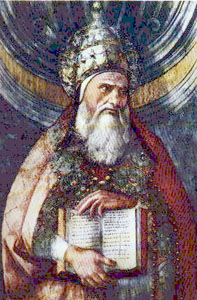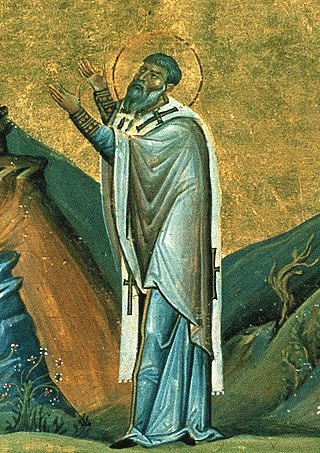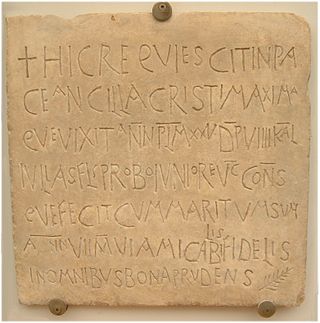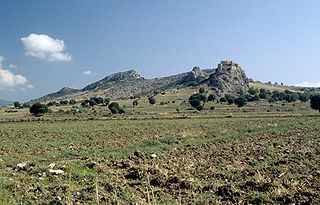See also
- Inscription of Abercius, hagiography of Abercius of Hieropolis
Abercius (Avercius, Avircius, Avirkios) is a masculine given name that may refer to:

Pius I was the bishop of Rome from c. 140 to his death c. 154, according to the Annuario Pontificio. His dates are listed as 142 or 146 to 157 or 161, respectively. He is considered to have opposed both the Valentinians and Gnostics during his papacy. He is considered a saint by the Catholic Church and the Eastern Orthodox Church with a feast day in 11 July, but it is unclear if he died as a martyr.
Year 167 (CLXVII) was a common year starting on Wednesday of the Julian calendar. At the time, it was known as the Year of the Consulship of Aurelius and Quadratus. The denomination 167 for this year has been used since the early medieval period, when the Anno Domini calendar era became the prevalent method in Europe for naming years.

The calendar of saints is the traditional Christian method of organizing a liturgical year by associating each day with one or more saints and referring to the day as the feast day or feast of said saint. The word "feast" in this context does not mean "a large meal, typically a celebratory one", but instead "an annual religious celebration, a day dedicated to a particular saint".

The inscription of Abercius is the Greek epitaph of Abercius who was probably Bishop of Hieropolis in Phrygia. It is an important example of early Christian epigraphy.

Alphaeus is a man mentioned in the New Testament as the father of two of the Twelve Apostles: Matthew the Evangelist and James, son of Alphaeus.

May 14 - Eastern Orthodox Church calendar - May 16

May 25 - Eastern Orthodox Church calendar - May 27
Saint Saturninus may refer to:
Saint Lucius is the name of:
Abercius and Helena are saints of the Catholic church. They are said to have been the children of Alphaeus the Apostle, although this has been challenged by some parties. Both of them are known to have been martyrs: Abercius by being exposed naked to bees, and Helena by stoning. They are commemorated with a feast day on May 20.

Abercius of Hieropolis was a high clergyman from Hierapolis at the time of Roman emperor Marcus Aurelius. He is maybe identical with an author who is called Avircius Marcellus in later sources. It is generally considered – although not indisputable – that he was bishop of Hierapolis and as such the successor to Papias.
Abundantius may refer to
Helladius may refer to:

Early Christian inscriptions are the epigraphical remains of early Christianity. They are a valuable source of information in addition to the writings of the Church Fathers regarding the development of Christian thought and life in the first six centuries of the religion's existence. The three main types are sepulchral inscriptions, epigraphic records, and inscriptions concerning private life.

Castabala, also known as Hieropolis and Hierapolis was a city in Cilicia, near the Ceyhan River.
Domnina can refer to:

The woman with seven sons was a Jewish martyr described in 2 Maccabees 7. She and her seven sons were arrested during the persecution of Judaism initiated by King Antiochus IV Epiphanes. They were ordered to consume pork and thus violate Jewish law as part of the campaign. They repeatedly refuse, and Antiochus tortures and kills the sons one by one in front of the unflinching and stout-hearted mother before eventually killing her as well.

October 21 - Eastern Orthodox liturgical calendar - October 23

On 12th February 2015, the Islamic State (IS) released a report in their online magazine Dabiq showing photos of 21 Egyptian Christian construction workers that they had kidnapped in the city of Sirte, Libya, and whom they reported had been killed. The men, who came from different villages in Egypt, 13 of them from Al-Our, Minya Governorate, were kidnapped in Sirte in two separate attacks on 27 December 2014, and in January 2015. On 15 February, a video was subsequently released showing their murder.

Perpetua and Felicity were Christian martyrs of the third century. Vibia Perpetua was a recently married, well-educated noblewoman, said to have been 22 years old at the time of her death, and mother of an infant son she was nursing. Felicity, a slave woman imprisoned with her and pregnant at the time, was martyred with her. They were put to death along with others at Carthage in the Roman province of Africa.